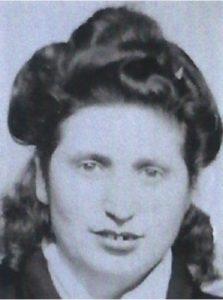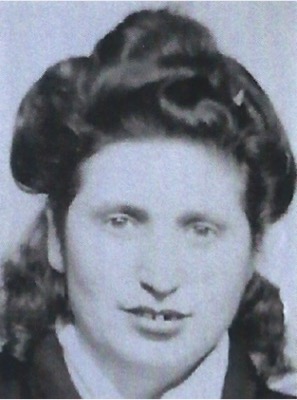Perla ITTAH (knows as Perlette)
Born on November 4, 1916 in Mogador, Morocco, Perlette Ittah was the daughter of Elias Ittah, who was born in 1889 in Mogador and Bobot Mazalto, who was born in 1890 in Mogador. Perlette spent the first few years of her life in the mellah (Jewish quarter) in Mogador.
In the hope of finding a better life, the Ittah family left Morocco just before Perlette’s tenth birthday and moved to France. They settled in Saint-Fons, a small industrial town south of Lyon. In the 1920s, this town was already home to a number of “Moroccan Jews”, primarily from Mogador. The Ittah family was first registered in France, in Saint-Fons, in 1926. At that time, they were living at 55, rue du Port, a working-class neighborhood of poorly qualified immigrants, not far from the Rhone River, where most of the chemical plants were located.
Perlette was the last child of the sibling group: she had one brother (Gointole, born in 1909) and two sisters (Messodi, born in 1913 and Marie, born in 1914). Her father, a laborer, was a member of the cultural and charitable Israelite society of Saint Fons, which dealt with the religious and day-to-day problems of the town’s Jews. In 1931, her father was a laborer at Coignet and her brother at Tulèze, while her sister, Messodi, no longer lived with her family. In the 1936 census, at the age of 20, only she and her brother were still living in the family home on rue Jean-Jaurès. That year, she was listed as a casual laborer who worked for the Dumonteil company.
On March 17, 1940, Perlette gave birth to a daughter named Jacqueline Annette, in the second district of Lyon, who was most likely a child of an extramarital relationship.
His brother Gointole was declared to have “Died for France” on June 18, 1940, in Saint Germain sur Meuse, while serving as a volunteer in the French army since September 1939 (his name is inscribed on the war memorial in Saint-Fons).
In 1944, Perlette was working as a laborer in the Saint-Gobain factory in Saint-Fons. The working environment was very harsh: she worked with bleach without gloves and with nitric acid without a mask, and the wages were poor.
During the Nazi occupation, the Ittah family had not been greatly troubled until the Allies advanced into France. This made life more difficult for people of the Jewish faith, and the Germans stepped up the pace of arrests. As a result of being denounced by a couple called Goetzmann and Benamara, informers who instilled terror in the Jewish community in Saint-Fons, the Gestapo arrested Perlette on June 27, 1944, in Saint-Fons, just as she was leaving work. Her sister Marie Ittah (married name Bornand) was arrested on the same day, at her parents’ home, reported by the same couple of informers, but she was lucky enough to be released before she was transferred to Auschwitz.
Alice Sellam said that she saw Perlette pass by that day surrounded by plainclothes individuals who seemed to be taking her away. She asked Perlette in Arabic what was going on and she replied that she had just been arrested by the Gestapo.
Perlette was taken to Fort Montluc in Lyon, a German military prison run directly by Klaus Barbie. During the month that she spent there, the prisoners’ living conditions were appalling and inhumane. Up to 8 people were held in cells measuring about 4 square yards. Meals were increasingly rare and food parcels were banned. There were no washrooms and insects thrived in the prison. Paulette was detained in cell 14.
Next, on July 27, 1944, Perlette was transferred to the Drancy internment camp where she stayed for four days. The living conditions were equally harsh: malnutrition soon led to dysentery and some of the French gendarmes abused the internees and increased the number of arbitrary punishments and shaming.
Finally, on July 31, 1944, 17 days before the Drancy camp was liberated, Perlette was deported on Convoy 77 from Bobigny railroad station to Auschwitz. There were 1309 people aboard this convoy, many of whom were small children, all crammed into cattle cars. When she arrived on the night of August 3, 1944, she was immediately subjected to the selection process, which almost always resulted in people being sent to the gas chambers. Perlette escaped that fate, but she had to endure forced labor, abuse and deprivation. It was there that Marcelle Benchetrit, a friend from Saint-Fons, met up with Perlette, who had already been there for a month.
Around October 28, 1944, as the Russian troops were advancing, Perlette was moved to the Kratzau camp in Czechoslovakia, about 250 miles west of Auschwitz, to work in a munitions factory. She was eventually liberated by Russian troops on May 8, 1945 and repatriated to France on June 7, 1945. Perlette later testified that she had never been involved in the Resistance.
After the war, on May 11, 1946, Perlette married Robert Pâtissier, a barman, born on February 26, 1925. Her husband took her daughter, Jacqueline, as his, and from then on, she bore his surname.
On September 3, 1953, the Ministry of Veterans and Victims of War awarded Perlette the status of “political deportee” for the period of internment from June 27, 1944 to July 30, 1944 and the period during which she was deported, from July 31, 1944 to June 3, 1945. She was one of only 251 people who survived this convoy, out of a total of 1309.
She died on May 20, 2003, at the age of 86, in Lyon.

بيرلا إيطاح (المسماة بيرليتْ)
1916-2003/الولادة : موغادور / الاعتقال : سان-فونس / الإقامة : ليون، موغادور
ولدتْ بيرلا إيطاح في رابع نونبر 1916 بموغادور في المغرب، فهي بنت إلياس إيطاح، المزداد في 1889 بموغادور وبوبوتْ مازالتو، المزدادة سنة 1890 بنفس المدينة. مرّت السنوات الأولى من حياة بيرليتْ داخل ملاح موغادور.
وتطلّعا إلى حياة أفضل، غادرتْ عائلة إيطاح بلدها المغرب قبل العيد الميلادي العاشر لبيرليت لتستقر في فرنسا بسان-فونس، وهي مدينة صغيرة صناعية تقع جنوب ليون. استقطبتْ هذه المدينة في سنوات العشرينيات عددا من اليهود المغاربة وخاصة منهم القادمين من الصويرة/موغادور. تمّ إحصاء عائلة إيطاح أول مرة في فرنسا بمدينة سان-فونس عام 1926. كانت تسكن وقتها برقم 55 زنقة الميناء، وهو حي شعبي يقطُنه مهاجرون بدون مهنة، يقع قريبا من الرون الذي كانت توجد به غالبية المعامل الكيماوية.
كانت بيرليت آخر طفل ضمن إخوتها، وكان لها أخ (يسمى كوينتول ازداد سنة 1909)، وأختان (مسعودي المزدادة سنة 1913، وماري المزدادة سنة 1914). والدها، عامل يدوي، كان عضوا بالجمعية الثقافية والخيرية الإسرائيلية في سان-فونس، التي كانت تُسير القضايا الدينية وتلك المتعلقة بالحياة اليومية ليهود المدينة. وفي 1931 كان والدها يعمل عند كوانيي وأخوه، في توليز، بينما أختها مسعودي لم تعد تسكن مع عائلتها. وفي إحصاء 1936، في سن 20 عاما، كانت بيرلا وأخوها وحدهما ما يزالان يقيمان في منزل العائلة بشارع جان جوريس. وتمّ إحصاؤها تلك السنة كمياومة تشتغل بمؤسسة دومونتاي.
في 17 مارس 1940، ولدتْ بيرليت بنتا أسمتها جاكلين آنيت، بالدائرة الثانية في ليون. وبدون شك، جاءت هذه الولادة نتيجة علاقة خارج إطار الزواج.
وتمّ التصريح بأخيها كوينتول بصفة “متوفّى من أجل فرنسا” يوم 18 يونيو 1940 بمدينة سان جرمان سور-موز، حينما كان ضمن المتطوعين المجنّدين في الجيش الفرنسي في شتنبر 1939 (اسمه مسجل على تذكار موتى مدينة سان-فونس).
وفي 1944، كانت بيرليت تمارس مهنة عاملة بمصنع سان غوبان بمدينة سان-فونس. ظروف العمل إبّانها كانت جد صعبة لأنها كانت تعمل في مادة جافيل دون قفازات وفي حامض النيتريك بدون قناع، بينما كانت الأجور متدنية.
مع الاحتلال النازي لم يتمّ المساس بعائلة إيطاح، لكن مع تقدم القوات الحليفة في فرنسا أصبحت الوضعية أكثر تعقيدا بالنسبة للأشخاص من الديانة اليهودية. وشرع الألمان في تسريع وتيرة الاعتقالات. هكذا، وعلى إثر الوشاية التي قام بها الزوجان غوتزمان-بنعمارة، وهما واشيان، جعلا الرعب يسود في الطائفة اليهودية بسان-فونس، اعتقلت بيرليت في 27 يونيو 1944 من طرف الجستابو بسان-فونس حينما كانت خارجة من عملها. أختها ماري إيطاح زوجة بورنان اعتقلت بدورها في نفس اليوم بمنزل والديها بسبب نفس الزوجين الواشيين. لكنّ أختها ستكون محظوظة بعدما أُطلق سراحها قبل ترحيلها نحو أوشفيتز.
تقول السيدة سلام أليس إنها ذلك اليوم رأت بيرليت محاطة بأشخاص بزي مدني كانوا يرافقونها. سألتْ هذه السيدة بيرليت بالعربية عمّا يجري، فأجابتها بأنه ألقي عليها القبض من طرف الجستابو.
سيقتْ بيرليت في نفس اليوم إلى حصن مونتلوك بمدينة ليون حيث يوجد سجن عسكري ألماني يديره مباشرة كلوس باربي. وطيلة أشهر كانت ظروف الاعتقال غير إنسانية. ذلك أن الزنازن الفردية من أربعة أمتار مربعة استقبلت ثمانية أفراد. وأصبحت الوجبات شيئا فشيئا نادرة، وألغيت البعيثات، ولم تعد أماكن النظافة موجودة، كما كثرت الحشرات في السجن. وقد وضعت بيرليت في الزنزانة 14.
نُقلت بيرليت بعد ذلك إلى معسكر الاحتجاز بدرانسي يوم 27 يوليوز 1944 حيث بقيت أربعة أيام. كانت الظروف أيضا جد قاسية : سوء التغذية يؤدي سريعا إلى الإسهال، أما بعض رجال الدرك الفرنسيين فكانوا يمارسون العنف على المقبوض عليهم وهو ما ضاعف من العقوبات العشوائية والإذلال.
أخيرا، رُحلت بيرليت من محطة بوبيني عبر القافلة 77 نحو أوشفيتز وذلك يوم 31 يوليوز 1944، أي 17 يوما قبل تحرير معسكر درانسي. هذه القافلة كانت مكوّنة من 1309 شخصا من بينهم كثير من الأطفال الصغار كُدسوا في عربات البهائم.
حين وصلتْ بيرليت في ليلة ثالث غشت 1944، تعرّضت للانتقاء الفوري الذي كان يؤدي تقريبا دائما إلى غرف الغاز، ولإن كانت فلتتْ من ذلك فإنها تعرضتْ للعمل الإجباري الشاق وما رافقه من المضايقات وسوء المعاملة والحرمان. وهنا التقتْ السيدة مارسيل بنشتريت، صديقتها بمدينة سان-فونس، بيرليت التي قضتْ شهرا هناك.
وحوالي 28 أكتوبر 1944، في مواجهة تقدم القوات الروسية، نُقلت بيرليت من معسكر كراتزو في تشيكوسلوفاكيا إلى 400 كيلومتر غرب أوشفيتز للعمل بمصنع للأسلحة. وفي النهاية تم إطلاق سراح بيرليت من طرف القوات الروسية يوم ثامن ماي 1945، ورُحلت يوم سابع يونيو 1945 إلى فرنسا. وتشهد بيرليت بأنه لم تكن لها أنشطة في المقاومة.
بعد الحرب، يوم 11 ماي 1946، تزوجتْ بيرليت في ليون بروبير، وكان صانع حلوى وبارمان، وُلد في 26 فبراير 1925. زوجها هذا اعترف بابنته جاكلين التي ستحمل اسمه.
وفي ثالث شتنبر 1953، منحتْها وزارة قدماء المحاربين وضحايا الحرب صفة “مرحّلة سياسية” عن مدة احتجازها التي دامت من 27 يونيو 1944 إلى 30 يوليوز 1944، ومدة ترحيلها من 31 يوليوز 1944 إلى ثالث يونيو 1945، حيث كانت ضمن 251 مرحلا في هذه القافلة من مجموع 1309 شخصا آخرين.
وبتاريخ 20 ماي 2003 توفيت بيرليت بمدينة ليون عن سن 86 عاما.
المساهمون : محمد اليعلاوي، عائشة زريويل، ليون سكوسوفسي ووالتر كانْ


 Français
Français Polski
Polski







